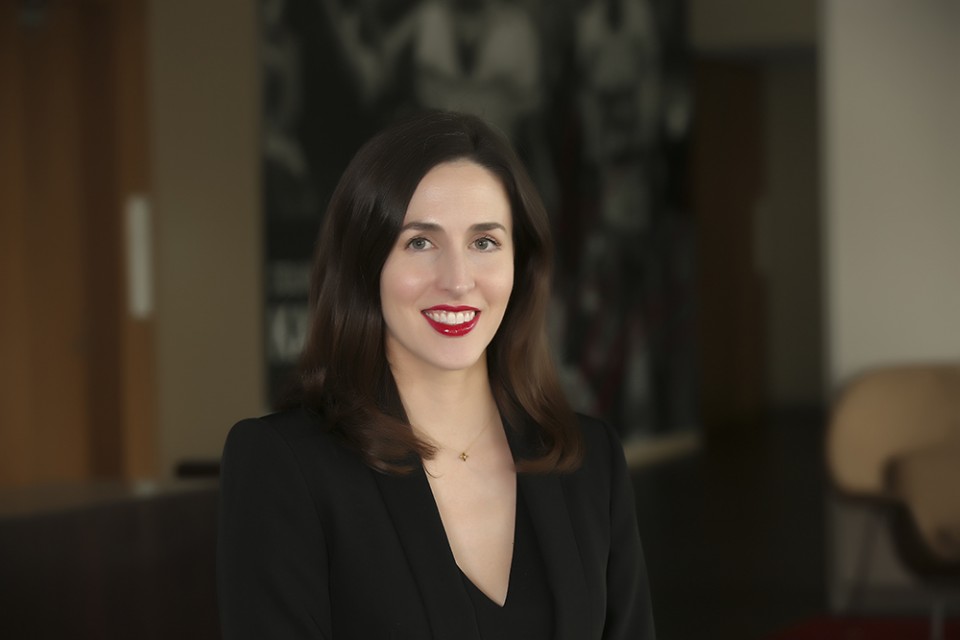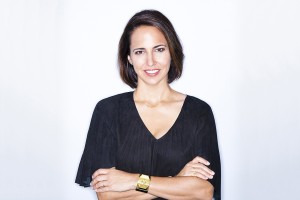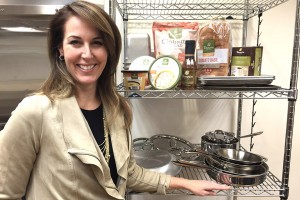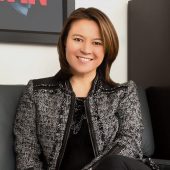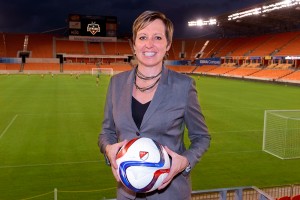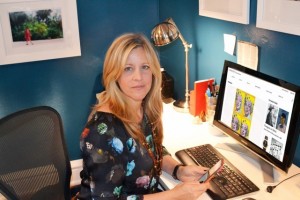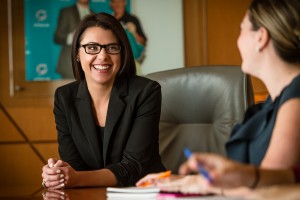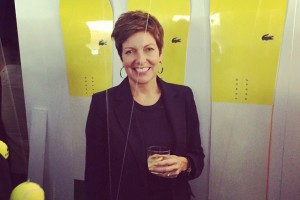Hannah Gordon, Vice President of Legal and Government Affairs for the San Francisco 49ers, and Stanford Grad
Hannah Gordon is the Vice President of Legal and Government Affairs for the San Francisco 49ers football team, a California native, and a Stanford Law School grad. She has a long history of working in the football field (pun intended!), as prior to her position with the 49ers, she also worked in media relations and as a reporter covering the sport. She then decided to go to law school, where she gained the background and skills to land her present position with the 49ers.
In addition to long days now tending to the legal aspects of the organization, she is a fan of the following: yoga; the neutral, I-mean-business black pantsuit for important meetings; and an unusual, but protein-packed breakfast idea: an energy-producing scramble of eggs, chicken breast, chicken sausage, bell peppers, spinach and a little onion.
She also gives props to two female leaders in her organization: the 49ers’ CFO, Cipora Herman, and their EVP, Patty Inglis, who both have, as she notes, “a deep knowledge in their areas of expertise.” Other helpful tips to be gained from Gordon below: her uproarious, succinct “don’t” comment about the workplace; three book recommendations (Oprah’s What I know for Sure, Simon Sinek’s Leaders Eat Last, and North America IKEA president Pernille Spiers-Lopez’s Design Your Life); and surprising facts about the female-advocacy aspects of the 49ers team.
Can you tell the readers a little bit about yourself?
I am the Vice President of Legal and Government Affairs for the San Francisco 49ers, in my fifth season with the team.
But technically, 2015 is my fifteenth season in football in one form or another — starting with the 2001 season, as a beat writer for the Daily Bruin, and then covering UCLA football, followed by going to a Super Bowl with the Raiders; covering the NFL for the NFLPA’s website; media relations for Cal when they had Aaron Rodgers and Marshawn Lynch on one team; working at the NFL league office (including during CBA negotiations); and joining the 49ers. (Even though Aaron and Marshawn are opponents now, it is fun to see the success of people you have worked with along the way: football is a people business!) It has been a great journey.
What does a day in your shoes typically look like?
Weekdays are meetings, tsunami waves of email, and hopefully enough quiet time to read and edit documents. The content of those meetings, emails and documents is always evolving.
I started here before Levi’s® Stadium had a single sponsor, much less a name or a shovel in the ground. It has been gratifying to work on a project that took thousands of people to make real, and that manifests in a beautiful LEED Gold building that tens of thousands of people get to enjoy every event day. I am proud of what a successful public-private partnership Levi’s® Stadium is.
As the construction agent, we came in at $134 million under budget, and finished the project a year ahead of schedule. Now, as we manage the venue for its owner (the Santa Clara Stadium Authority), the focus is on operations, as well as all the other aspects of our business. Also. people might not realize that in addition to running an NFL team, the 49ers, through free field trips to the 49ers Museum, taught 30,000 children about Science, Technology, Engineering and Math last year — and got 17,000 kids active through 150 youth football camps.
Sundays are my favorite days. No matter what shoes I wear, my feet usually hurt after running around for hours — but after a win, I don’t care if my feet hurt!
What are the first three things you do when you wake up in the morning, and the last three things you do before you go to bed?
Wake up: Look at the phone and check work email (unhealthy addiction), then off to work out: weights or a walk with our team chaplain, and our Vice President of Football Affairs, or stadium stairs with our Director of Player Engagement.
Before bed: Brush teeth, put away electronics (thanks to sleep tips from our human performance staff), and have quiet reflection time. Recently, I have been reading one essay a night from Oprah’s book What I Know for Sure.
What is your breakfast of choice?
Our workplace is like the TV show Cheers — but instead of knowing my name and my drink, Anthony and Daniel know my scramble: regular eggs with chicken breast, chicken sausage, bell peppers, spinach and a little onion! Chef Chad and his team feed us healthy and delicious food every day, and for that I am grateful at every meal.
What keeps you energized and motivated at work?
I am energized by the people and the constant problem-solving. I am motivated by the desire to do right by other people and make them proud.
What is the favorite part of your job?
I love the variety; I get to interact with so many different people both within and outside of our building. (Oh, and we have been to three NFC Championship Games and a Super Bowl in the last five years. I love the rhythm of the season and the opportunity to compete every year for a championship!)
What and who inspires you at work?
What inspires me: The opportunity to affect positive change.
Who inspires me: My team and the people around us.
Do you have a ‘Power Outfit’ that you wear for a big meeting or important work event?
I love clothes, but if I have a big meeting, I will often fall back on a black pantsuit. It’s easy, comfortable, and a traditional uniform for authority. If you are presenting to others or meeting new people, you want to keep the focus on what you have to say.
What is your favorite leisure activity after a stressful work week?
There is a great yoga teacher near the stadium in Santa Clara who teaches Friday evenings.
How does your culture/background influence your work?
Having grown up in the Bay Area, I value being in a culturally diverse environment: having different viewpoints leads to better decision-making.
What has been the biggest obstacle in your career, and how did you overcome it?
I had one job where a person in my line of reporting excluded me; I had always been a “pleaser” and the situation shook my confidence. From that, I got two different and helpful pieces of advice. First, in response to my failed attempts to be accepted, my aunt told me, “That man is never going to like you.” Second, my father told me, “Ever since you were a little girl, you were an advocate for justice for others. You have to fight for yourself like you fight for other people.” I gained the courage to address the problem, but ultimately the solution was to recognize a toxic situation and get out.
What are your most steadfast ‘don’ts’ rules regarding work and the workplace, and what are your most cherished ‘do’s’?
Do treat everyone with respect, including yourself.
Don’t wear shoes for a strip club — unless that is your place of employment!
What are the most important qualities of a good leader?
Good leaders care about the people they lead. Our COO, Al Guido, gave a number of us Simon Sinek’s book Leaders Eat Last, and it illustrates that theory. You can see it in football and business: players and employees are attuned to whether or not leaders care about them.
What are the unforgettable traits of role models who have inspired you most?
Our CFO, Cipora Herman, and our EVP, Patty Inglis, share a number of traits that I aspire to. They are courageous, intelligent women who speak their minds, and have deep knowledge in their areas of expertise.
How have mentors impacted your personal and professional development?
No one gets where they are alone. I think formal mentor programs can be valuable, but almost all of my mentors have been informal. I have been fortunate to have more mentors whom I can appropriately thank here. They have been both male and female, supervisors and non-supervisors. They have given me advice, offered encouragement, and opened doors, and the mentors who have impacted my personal development are usually the ones who challenge me. (They know who they are!)
With respect to professional development, I am a big believer in the power of words: a mentor can change your perception of what is realistic if they believe in you.
What advantages do you see as a woman in the workplace?
Everyone’s experience is unique and shaped by an intersection of social constructs, including gender, race, socioeconomic status, as well as the workplace itself, so it is hard for me to generalize.
In terms of being a woman in this particular workplace, we are a woman-owned NFL team. We have a female youth football coordinator, and one of only three female assistant trainers in the league. We also have a fellowship named after our owner. The men in our football analytics department lobbied for the fellowship this year because they know that women have been underrepresented in their field. They hired a talented young woman out of college as a result.
What advice would you give to women starting their careers?
If you want to be taken seriously, then be serious. Work hard. Commit to developing your skills and building experience.
What book would you recommend for women just starting their career?
I wish I had more time for pleasure reading! I am eager to read the books the other women profiled by SharpHeels have recommended. Also, I just heard Pernille Spiers-Lopez, former President of IKEA North America, speak about her new book, Design Your Life. I am excited to read the book, and would encourage any young woman starting her career to think of herself, as Pernille suggests, as the designer of her life, and to put time and thought into that design.
What is your favorite quote you try and live by?
Maya Angelou left us great wisdom. This quote applies not only to our personal lives but also to business and negotiation: “I’ve learned that people will forget what you said, people will forget what you did, but people will never forget how you made them feel.”
Photo Courtesy of: Terrell Lloyd, San Francisco 49ers
TAGS: SharpSavvySignificant
 Interviewer Interview Prep
Interviewer Interview Prep Impactful Mentees
Impactful Mentees Benefits of a Mentor
Benefits of a Mentor Advice for First-Time Managers
Advice for First-Time Managers Overcoming the 18-month Itch
Overcoming the 18-month Itch Dressing for Your Style
Dressing for Your Style Interview Style Tips
Interview Style Tips Women's Stocking Stuffers
Women's Stocking Stuffers Gift the Busy Traveler
Gift the Busy Traveler Father’s Day Gift Guide
Father’s Day Gift Guide Airport Layover Activities
Airport Layover Activities Traveling & Eating Healthy
Traveling & Eating Healthy Travel Like a Boss Lady
Travel Like a Boss Lady The Dual California Life
The Dual California Life Gifts for Thanksgiving
Gifts for Thanksgiving Summer Reading List
Summer Reading List Top Leisurely Reads
Top Leisurely Reads New Year, New Books
New Year, New Books Life Lessons from a Sitcom
Life Lessons from a Sitcom Oprah, Amy or Amal?
Oprah, Amy or Amal?





